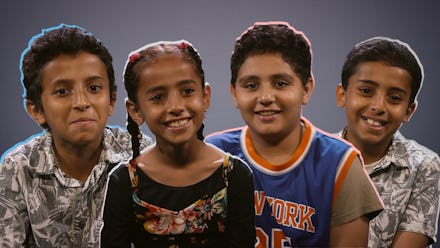These Muslim kids are only in elementary school — and in the classroom, they're called terrorists

Since President Donald Trump was elected, civil rights groups have noticed an uptick in schoolchildren quoting the president's own words to bully their peers.
Forty-two percent of Muslim families reported their children had experiences with anti-Muslim bullying, according to a 2017 study from the Institute for Social Policy and Understanding. One in four of these reported incidents came from teachers or other school officials.
Mic interviewed four Muslim schoolchildren in New York to hear about their experiences in the classroom: Moheeb, 11, Shahrazad, 8, Enan, 10, and Saif, 11. These Muslim kids don't know much about Trump other than the fact he's the president of the United States and wants to ban Muslims. This doesn't bode well for Shahrazad and her family in war-torn Yemen.
"I have family in Yemen," Shahrazad said. "[They] can't come if Donald Trump makes another ban. When I pray, I ask God to help America and Yemen."
Trump and members of his administration have often stated that "Islam hates us" and that Muslims have a "predisposition" to terrorism. In turn, hate crimes and Islamophobic speech has exponentially increased since Trump began his presidential campaign. Islamophobia also spiked immediately after the Sept. 11 attacks. But these children have no recollection of the tragedy that unfolded in 2001. They weren't even born yet.
Enan and Shahrazad, for example, don't think of 9/11 other than a date that comes between Sept. 10 and Sept. 12. "I don't know what 9/11 is," Enan said.
But despite not knowing who Osama bin Laden was or having any relations to al-Qaeda, they are still suffering from the anti-Muslim backlash that erupted about 15 years ago.
Moheeb is fed up with the bullying from his classmates and the lack of response from his educators. He recounted when two of his classmates, on different occasions, called him a terrorist. In one incident, Moheeb said he told two of his principals and that they didn't really take any action.
In another incident, Moheeb said he told his teacher that a female classmate called him a terrorist. The teacher then talked to the female classmate, who is of Puerto Rican descent and who Moheeb said he mistakenly called "Mexican," about the name-calling. Then, according to Moheeb, the teacher only sent him to the principal's office.
Now, Moheeb said, he ignores the bullying.
"I feel mad, because I don't think [students and teachers] understand how I feel," Moheeb said. "I sometimes ignore [the bullying]. If I cry about it, they'll do [it] more."